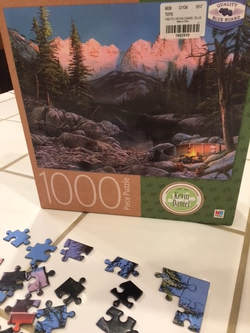
Here is a quick review of the four criteria we have established as part of a checklist to determine whether something is true or false. (1) Evidence that there is an independently verifiable correspondence between some statement or theory and the actual physical world is evidence that the statement or theory is true. Last night we used a picture of a sketch of Trophy Point juxtaposed with an actual picture of that scene as a metaphor to convey the idea of correspondence. (2) Evidence that a statement or assertion or theory is coherent with other facts, assertions, or theories supports the truth of the statement, assertion or theory under question. The phrase "is coherent with" means the assertion or theory under consideration "fits" with other assertions, facts or theories that are commonly held to be true. The picture association with tonight's post--a jigsaw puzzle--is a great metaphor for coherence: we assemble jigsaw puzzles by determining where pieces "fit", and that process usually consists of some consideration of what the surrounding pieces look like. (3) Independent verification of the correspondence and coherence relationships identified in (1) and (2) above. As we have made emphatically clear, consensus is not enough to establish truth by itself. However, as part of a set of criteria for truth, the ability to have independent agents verify the correspondence and / or coherence is legitimate support for the truthfulness of an assertion or theory. (4) The fourth criteria for truth we identified last night is the ability to predict. If a statement or theory allows people to accurately predict future outcomes, that ability to predict is evidence for the truth or validity of the assertion or theory under consideration.
In graduate school, we spent large blocks of time discussing each of these aspects of truth. Entire books have been written focusing on different aspects of these criteria. The point of accountability citizenship is not to engage in an esoteric philosophical examination of this subject. Rather, we simply aim to provide everyday Americans with a set of valid tools that anyone can use to assess the truthfulness of the myriad conflicting assertions that populate our news cycle these days.

 RSS Feed
RSS Feed
